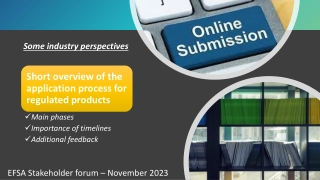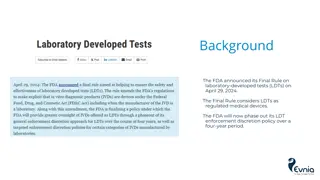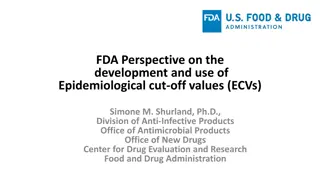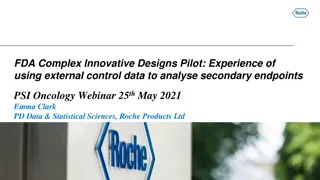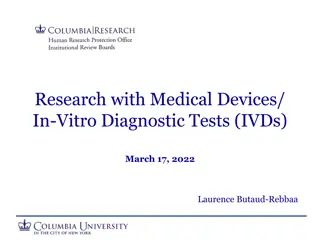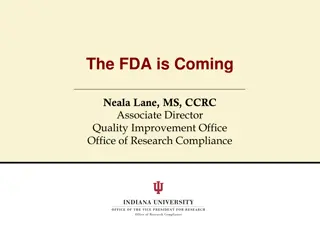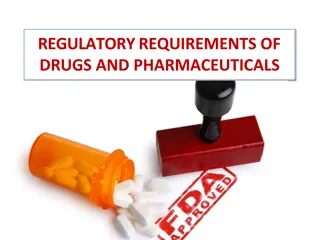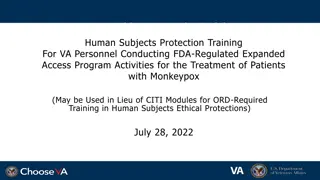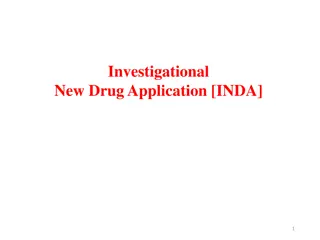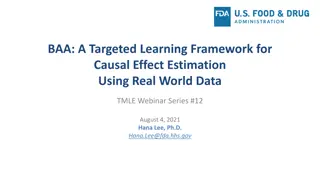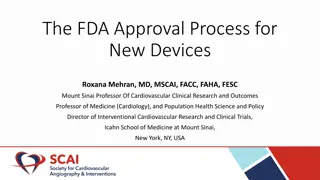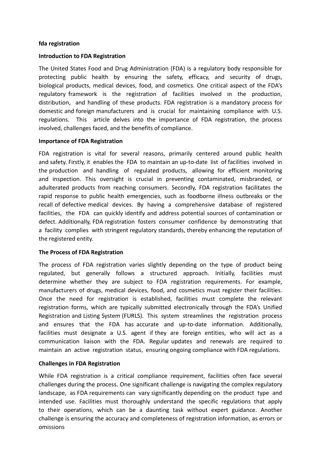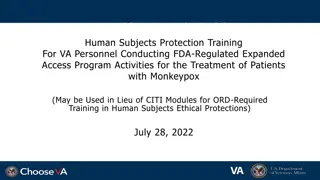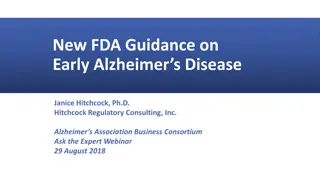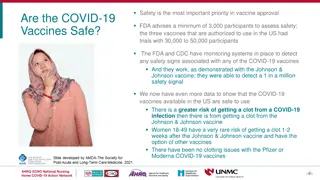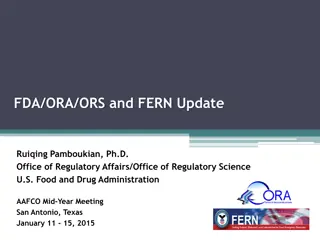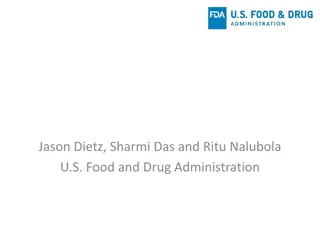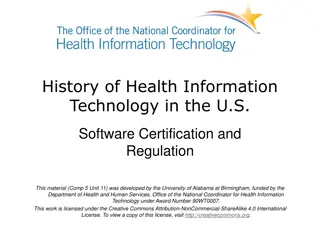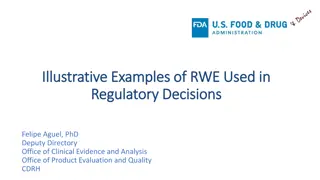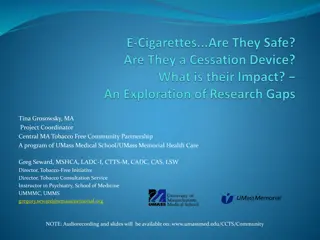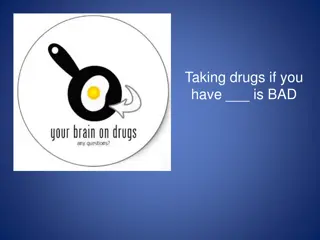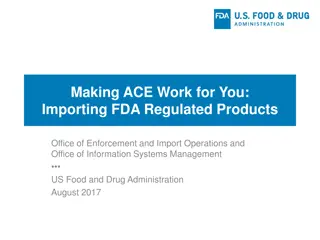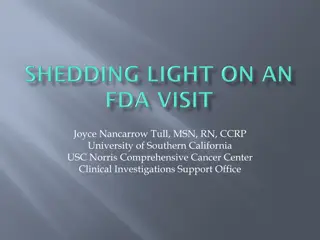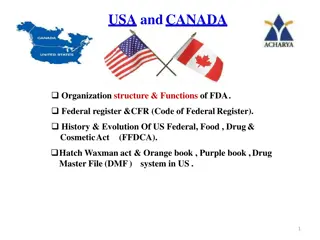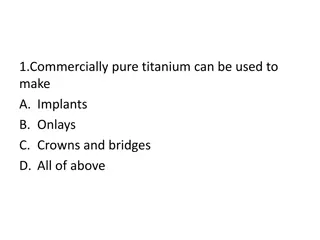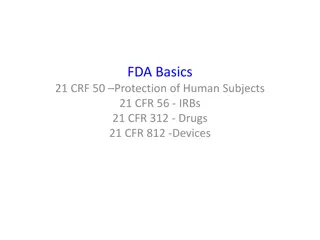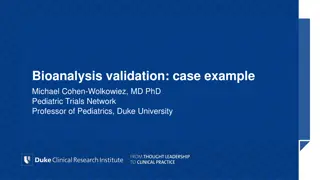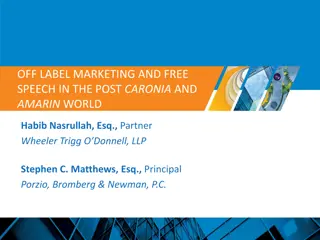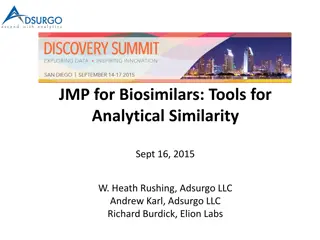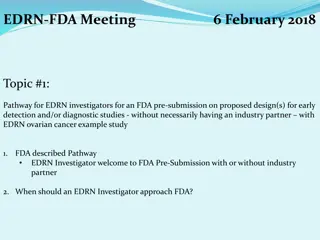Insights into Regulated Product Application Process
Gain valuable perspectives on the phases and importance of timelines in applying for regulated products. Explore feedback and suggestions for optimizing the process. Learn about EFSA's role and stakeholders' insights.
0 views • 10 slides
Introduction to Flood Risk Assessment with HEC-FDA Overview
This presentation delves into flood risk assessment using HEC-FDA software, covering topics such as defining flood risk, components of uncertainty, consequences of flood risk, and methods to assess flood risk including hydrology, hydraulics, geotechnical, and economics. It explores the intersection
6 views • 39 slides
FDA's Final Rule on Laboratory-Developed Tests (LDTs) and Phase-Out Policy
The FDA announced its Final Rule on laboratory-developed tests (LDTs), considering them as regulated medical devices. The phased-out policy will gradually enforce compliance with premarket review, quality system regulation, and other requirements over several stages. Additionally, a limited enforcem
2 views • 6 slides
FDA Perspective on Epidemiological Cut-off Values (ECVs)
The FDA presents insights on the development and use of Epidemiological Cut-off Values (ECVs) to distinguish wild-type populations from those with acquired resistance mechanisms. ECVs are crucial for determining antimicrobial susceptibility and guiding treatment decisions. The process involves analy
0 views • 13 slides
Experience in FDA Complex Innovative Designs Pilot Meeting: Incorporating External Controls in Phase 3 Study for DLBCL
Explore the experience of participating in the FDA's CID Pilot Meeting, focusing on designing a Phase 3 study for DLBCL with an external control arm for secondary overall survival. Discover key considerations for future studies with external controls to address high unmet medical needs in DLBCL pati
0 views • 13 slides
Understanding FDA Regulations and Medical Device Classification
The Food and Drug Administration (FDA) plays a crucial role in regulating research, manufacturing, marketing, and distribution of medical devices. Medical devices are classified based on risk and intended use, with three main categories determining regulatory pathways. The classification system help
2 views • 27 slides
Understanding the FDA Audit Process in Research Compliance
The FDA conducts audits to ensure compliance with regulations in research settings. The process involves site notification, preparation, visit, and final determinations. Site preparation includes alerting staff, reserving rooms, ensuring access to necessary equipment, and preparing relevant document
0 views • 17 slides
Understanding Regulatory Requirements of Drugs and Pharmaceuticals
Drug regulation involves controlling drug use through international agreement authorities like the FDA, EMA, and PMDA. The FDA plays a crucial role in drug evaluation and research, biologic evaluation, devices, and food safety. There are various types of applications for drug approval, along with a
0 views • 28 slides
Understanding the NDA and ANDA Regulatory Approval Process
The New Drug Application (NDA) submission process to the FDA involves extensive documentation of non-clinical, clinical, and drug chemistry data to support the product's labeling. Key decisions during the FDA review include evaluating the drug's safety, effectiveness, labeling, manufacturing methods
0 views • 19 slides
Considerations for Guernsey Regulated Insurance Providers Issuing Policies in the UK
This presentation outlines key issues for Guernsey regulated insurance entities when issuing policies on a non-admitted basis in the UK. It emphasizes the differences between the regulatory regimes in Guernsey and the UK, highlighting challenges and recommendations while comparing solvency models, r
2 views • 9 slides
Ethical Protections in Research: Historical Perspectives and Training Objectives
Explore the evolution of ethical protections in research involving human subjects, from key historical events to current regulations governing VA research. Understand the responsibilities of investigators and entities in the approval process, along with pathways for accessing drugs via FDA's Expande
0 views • 25 slides
Understanding DBS (Disclosure & Barring Service): Purpose, Process, and Categories
The Disclosure and Barring Service (DBS) is a critical aspect of ensuring safe recruitment decisions, particularly for roles involving children and vulnerable adults. This service helps organizations across sectors in England and Wales identify unsuitable candidates by providing access to criminal r
0 views • 14 slides
Understanding Investigational New Drug Applications (INDA)
An Investigational New Drug Application (INDA) is a crucial submission to the FDA for permission to conduct clinical studies on new drug products. It plays a pivotal role in assessing the safety and efficacy of new drugs before they can be marketed and distributed for human use. This article covers
0 views • 30 slides
Targeted Learning Framework for Causal Effect Estimation Using Real World Data
Hana Lee, Ph.D., presents a webinar on the Targeted Learning Framework for Causal Effect Estimation using Real World Data (TMLE). The project aims to help the FDA develop a structured approach to incorporating real-world data into regulatory decision-making. TMLE offers a systematic roadmap aligned
0 views • 27 slides
Understanding the FDA Approval Process for Medical Devices
The FDA approval process for new medical devices involves rigorous evaluations to ensure safety and effectiveness. Conflicting criticisms of the FDA focus on the balance between tightening or loosening regulations without compromising public health. The agency's mission emphasizes protection and adv
0 views • 19 slides
Understanding Power Supplies and Rectifiers in Electrical Systems
Power supplies play a crucial role in converting AC power to DC power, with two main types being unregulated and regulated. Regulated power supplies consist of essential components like a step-down transformer, full-wave rectifier, filter circuit, and voltage-regulating circuit. Rectifiers are devic
0 views • 25 slides
fda registration
IAS helps organizations to register their products in US FDA. It is always a tedious process to collect and file the application as the US-FDA has got stringent rules. We are having experience in US-FDA registration thus we put forward our Services t
3 views • 2 slides
Comprehensive Human Subjects Protection Training for VA Personnel
This training addresses the ethical principles and regulations governing VA research involving human subjects, focusing on conducting FDA-regulated Expanded Access Program activities for Monkeypox treatment. It covers historical events shaping research practices, key responsibilities of investigator
0 views • 25 slides
New FDA Guidance on Early Alzheimer's Disease - Janice Hitchcock, Ph.D.
Janice Hitchcock, Ph.D., discussed the new FDA guidance on early Alzheimer's disease in a webinar. The guidance highlights key sections such as introduction, background, and diagnostic criteria. It emphasizes the importance of early intervention, appropriate outcome measures, and diagnostic criteria
0 views • 13 slides
Understanding Section 42 Enquiries in Regulated Care Settings
Demystify Section 42 enquiries in regulated care settings with insights, tips, and learning themes. Learn about the safeguarding service, good enquiry practices, incorporating personal safeguarding, recent enquiry themes, tools, and more. Discover how the service works, who can undertake enquiries,
0 views • 20 slides
COVID-19 Vaccines: Safety, Effectiveness, Development, and Trust
COVID-19 vaccines authorized in the US have undergone rigorous safety assessments with large trial participant numbers. The FDA and CDC actively monitor for any safety signals. The vaccines are proven safe and effective, developed quickly due to global collaboration and resources. Trust in the vacci
0 views • 12 slides
Overview of FDA Office of Regulatory Affairs (ORA) and Office of Regulatory Science (ORS)
This information provides insights into the organizational structure and functions of the FDA Office of Regulatory Affairs (ORA) and the Office of Regulatory Science (ORS). It includes organizational charts, details about ORA laboratory locations, and the local structure of an ORA laboratory. Additi
1 views • 31 slides
Understanding Food Additives: Types, Regulation, and Uses
Food additives play a crucial role in preserving, enhancing, and processing foods. They can be natural or synthetic substances added to food for specific purposes. Regulated by the FDA, these additives aim to improve storage properties, increase healthfulness, enhance appeal, and aid in food process
0 views • 15 slides
Education Initiative on Agricultural Biotechnology by U.S. FDA
U.S. FDA developed an initiative to educate the public on agricultural biotechnology, addressing misinformation and promoting science-based information. The initiative involves research, stakeholder consultations, and the release of materials in multiple languages to increase consumer understanding
0 views • 12 slides
Evolution of Health Information Technology Software Certification and Regulation
Explore the history of FDA involvement in clinical software regulation, the role of CCHIT, changes in EHR certification due to the HITECH Act, and recent efforts to enhance EHR safety. Learn about certification processes, FDA's role in regulation, challenges faced, and the importance of human interv
0 views • 32 slides
Examples of Real-World Evidence in Regulatory Decisions by FDA
FDA showcases illustrative examples of how Real-World Evidence (RWE) has been utilized in regulatory decisions, highlighting its value across different submission types, data sources, and purposes from FY12-FY19. The FDA report features cases like a modified hemodialysis catheter end cap, tumor prof
0 views • 14 slides
Unregulated Risks of E-Cigarettes: FDA and Safety Concerns
E-cigarettes, unregulated and not FDA-approved, pose health risks with potential carcinogens and toxic chemicals. Lack of oversight allows for manufacturers to sell products with varying safety standards. FDA testing has revealed concerning findings, yet regulations are limited in addressing key iss
0 views • 40 slides
Substance Abuse Treatment Strategies and FDA-Approved Medications
Explore the various substance abuse treatment approaches, including psychological and pharmacological interventions, along with FDA-approved medications like disulfiram, naltrexone, and buprenorphine. Learn about the challenges in substance abuse treatment and the psychology of substance users. Disc
0 views • 13 slides
ACE Guide: Importing FDA Regulated Products
Access resources and information to successfully import FDA regulated products using ACE. The Office of Enforcement and Import Operations and Office of Information Systems Management at the US Food and Drug Administration provide guidance in this August 2017 publication.
0 views • 157 slides
Expert Tips for Successful FDA Inspections
Gain insights from Joyce Nancarrow Tull, an experienced professional, on navigating FDA inspections successfully. Learn about legal authority, inspection procedures, key strategies, and more. Be proactive, seek expert advice, and build knowledge to enhance your readiness for FDA audits.
0 views • 31 slides
Understanding the Structure and Functions of FDA in the USA and Canada
The Food and Drug Administration (FDA) in the USA is a critical agency within the Department of Health and Human Services responsible for regulating the safety of various products such as foods, drugs, medical devices, and cosmetics. The FDA has distinct organizational units like the Office of the C
0 views • 49 slides
Dental Materials Overview and Standards
Dental materials play a crucial role in various dental procedures such as implants, onlays, crowns, and bridges. Different materials like titanium and ceramics are utilized, with standards set by organizations like the ADA, ISO, and FDA. Safety and quality assurance are vital for restorative dental
0 views • 10 slides
Understanding FDA Regulations in Clinical Research
FDA regulations in clinical research cover the protection of human subjects, IND/IDE requirements, risk determinations, application processes, and what falls under FDA regulation. It distinguishes between FDA-regulated activities and those not regulated, such as medical record reviews. The scope inc
0 views • 31 slides
Bioanalysis Validation Case with Michael Cohen-Wolkowiez at Duke University
Michael Cohen-Wolkowiez, MD PhD, a Pediatric Trials Network Professor at Duke University, conducted a bioanalysis validation case study involving Meropenem in infants funded by NIH. The study focused on PK and safety data for FDA registration consideration. High-level results showed significant diff
0 views • 6 slides
Off-Label Marketing and Free Speech in the Post Caronia and Amarin World
Background of off-label use and prohibition, First Amendment challenges to FDA authority, next steps for industry and FDA in responding to the new legal landscape. FD&C Act prohibits misleading labeling, FDA's regulatory authority on drug and device promotions, FDA's view on off-label promotion proh
0 views • 19 slides
Understanding Biosimilars: Tools for Analytical Similarity
Explore the world of biosimilars, the complexities of comparing generic and brand drugs, FDA regulations, and the first FDA-approved biosimilar. Learn about biological products, the Biologics Price Competition and Innovation Act, and the challenges in defining potency, purity, and stability in biolo
0 views • 26 slides
Urinary Tract Infection Treatment and Prevention During Pregnancy
Effective management of urinary tract infections (UTIs) during pregnancy involves promoting urinary health, emphasizing safety of antimicrobial treatment, and understanding FDA categories for medication use. Recommendations include fluid intake, perineal hygiene, and maintaining bladder health. Safe
0 views • 13 slides
Companies (Cost Records and Audit) Amendment Rules 2014 Overview
The Companies (Cost Records and Audit) Amendment Rules 2014, presented by CMA Harshad S. Deshpande, cover the applicability of cost records and cost audit for companies in regulated and non-regulated sectors. The rules specify the class of companies engaged in production or services that must mainta
1 views • 41 slides
Lowered Endothelial Damage in African Americans Linked to Cocaine Abstinence
Cocaine use is a significant public health concern in the US, affecting many communities. A preliminary study by Johns Hopkins School of Medicine suggests that abstaining from cocaine and reducing its use may lead to decreased endothelial damage in African Americans. FDA has not approved medications
0 views • 32 slides
Pathway for EDRN Investigators in FDA Pre-Submission for Early Detection Studies
EDRN investigators can approach the FDA for pre-submission without an industry partner for proposed early detection study designs. The process involves validation, verification, and discovery stages in the biomarker pipeline, utilizing various technologies and biospecimen sets. An example from the o
0 views • 18 slides
